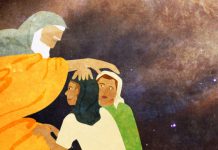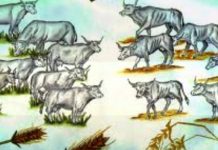Joseph Dreams, Gets Thrown Into a Pit, and Begins His Rise to Egyptian Power
As the scorpions lunged at his feet, Joseph again appealed to his brothers. “Have compassion! This pit is full of snakes and scorpions!”
Joseph’s brothers were not listening. His screams were disturbing their meal, so they traveled some distance from the pit to better enjoy their kabob. As they looked up to notice a caravan of Ishmaelites approaching from the north, the brothers decided to sell Joseph to them.
Meanwhile, another group of Midianite merchants happened to be passing by from the south. They heard Joseph’s screams and immediately pulled him from the pit. They saw his dress and manner and assumed he must be the son of a nobleman.
As Joseph’s brothers saw what was happening, they came running toward the pit. “What right do you have to take our slave?” they demanded.
“Your slave?!” questioned the Midianites, “You should be his slaves!” When Shimon and Levi took out their swords, however, the demeanor of the Midianites changed. “Alright, don’t get violent about it! How about selling him to us?” the merchants chimed. The brothers bartered Joseph for shoes for the entire family, and were thus rid of their brother.
The Midianites, however, had misgivings about the entire affair. “Maybe he’s the son of a chieftain who will come looking for him,” they theorized. “He’s too hot! Let’s get rid of him at the first opportunity.” When the Ishmaelite caravan came into sight, it offered the perfect solution. The Ishmaelites usually transported foul smelling items such as pitch and tar, but this particular caravan happened to be transporting spices and incense to Egypt. Despite the indignation of being repeatedly sold as a slave, Joseph was finally heading down to Egypt … in the most fragrant manner possible. (based on Midrash)
So begins the plot that eventually takes Jacob and his family to the bitter exile in Egypt.
Parshat Vayeshev is about dreams. Why do people dream? Some dreams may be prophetic, but most are obviously not. People tend to dream about the things they think about during the day. The mind keeps functioning even when one is asleep.
How can one know the meaning of a particular dream? The Talmud says that dreams “follow their interpretation.” The way they are interpreted, so are they fulfilled.
JOSEPH’S DREAMS
Joseph was the 11th son of Jacob, and the first-born of his beloved wife Rachel who later died in childbirth. Joseph was a prodigy and became his father’s prime disciple. Jacob showed Joseph favoritism (for which he was criticized by the Sages) and made him a supervisor over his brothers. Jacob also had a special striped garment made for Joseph. Joseph “snitched” on his older brothers out of his genuine love and concern for their spiritual growth. The brothers, however, didn’t see things that way at all.
Joseph had a dream. He called his brothers together and described the dream: “We were all gathering sheaves of grain (they were shepherds, not farmers – so why grain?), and your sheaves bowed down to mine.”
The brothers’ reaction was, “Will you rule over us and be our king?” (Genesis 37:8) They had thus interpreted the dream.
Joseph had a second dream. “The sun, moon and 11 stars were bowing down to me.” This time the brothers got smart and kept quiet about any interpretation. But Joseph wanted the fitting interpretation, so he went to his father and told over the dream. Jacob exclaimed, “Will I and your mother and brothers bow down to you?” Thus he interpreted the dream as well.
Question: Didn’t his mother already die?
Answer: The sages explain that it refered to Bilhah, who brought him up as her son.
“His brothers were jealous, but his father waited for the events to materialize” (Genesis 37:11). Joseph’s brothers suspected him of manipulation. They suspected that he wanted to be the sole heir of Jacob, just as Abraham and Isaac had only one continuation of the line. Joseph constantly reported bad things about his brothers to their father. They believed he was plotting to get his father to curse them, so he could take the entire inheritance.
When Joseph dreamed of becoming a king, this really enraged the brothers. They did not see these dreams as prophecies, but rather as a manifestation of what he was thinking about all day. The brothers considered their analysis genuine, but the Torah reveals that it emanated from jealousy. We are often not aware of what our true motivations are. We must meditate and introspect very carefully to discover the motivations that drive us.
PEACE WITH THE BROTHERS
Joseph’s brothers went to Shechem to tend to the flocks and deliberate about the situation. Shechem was the site where they’d earlier taken affirmative action to maintain the brotherhood, when it was threatened from without (Dinah was kidnapped). Now there was a threat from within – Joseph – who they thought wanted it all.
Jacob was aware of the animosity between his sons, and sent Joseph to look for his brothers. “See the peace of your brothers and the peace of the sheep, and return to me with a report” (Genesis 32:14). In other words, “make peace with your brothers!”
THE BROTHERS’ RABBINICAL COURT
As Joseph searched for his brothers, he was met by a man (tradition says this was the angel Gabriel) who hinted to Joseph that his brothers were out to get him. Yet Joseph was following his father’s instructions and paid no heed to the warning. As the brothers noticed Joseph’s approach, they started to plan his reception party.
Though this sounds like evil men conniving to murder their own flesh and blood, this cannot be true. We are talking about the righteous sons of Jacob, the fathers of the Twelve Tribes of Israel who taught morals and ethics to the world.
In actuality, the brothers convened a rabbinical court and tried Joseph. Some religions teach: “Resist not evil, turn the other cheek!” (Just don’t try hitting the first cheek!) Judaism, by contrast, teaches “Resist evil!” For example, if you know that someone is plotting to get up at 4 a.m. to kill you, the Sages advise you to get up at 3 a.m. and kill him first.
This “rabbinical court” convicted Joseph of wanting to harm his brothers, and thus Joseph was regarded as having the status of “actively harming others,” who we are obligated to stop, even by killing him.
“Here comes the dreamer!” they proclaimed. “Let’s kill him, throw him into a pit, and claim that a wild beast killed him” (Genesis 37:20). This was a legal death sentence.
REUVEN SAVES THE DAY
Reuven said, “We must not put him to death with our own hands! He is, after all, our flesh and blood. Let’s throw him into a pit and let him die of natural causes.” They understood that if God was with Joseph, he would survive.
Reuven’s plan was to come back later and free Joseph. Reuven, as the first born and presumed leader of the next generation, had the most to gain from the death of Joseph. Yet Reuven felt responsibility and tried to save him. ( He was also aware of the fact that he would carry the blame as well.)
INTO THE PIT
When Joseph arrived, the brothers immediately removed his striped coat, which had caused so much jealousy and animosity. Then they threw him into the pit, which was “empty, it had no water” (Genesis 37:24). The brothers had checked to see if it had water, but didn’t notice that it contained snakes and scorpions. Joseph’s life was in peril and God protected him from the creatures. (The Talmud states that if one testified that a man fell into a pit with snakes and scorpions, his wife may remarry – for he is surely dead!) Yet the brothers didn’t even notice the miracle.
Reuven had to go attend to Jacob, so Judah took upon himself the leadership role. The brothers noticed a passing caravan of Ishmaelites. Judah said, “Why kill our brother and cover his blood? If we sell him to Egypt, he will be out of our hair with no bloodshed, and we can make a handsome profit as well!” The brothers all agreed and the act was done.
When Reuven returned to the pit and found it empty, he tore his garments and cried, “The lad is missing and where shall I hide from father’s pain?” (Genesis 37:30) – i.e. “He was only a lad and hadn’t really been trying to harm us!”
The brothers dipped Joseph’s garment in goat’s blood and sent it to their father. Jacob recognized the garment and declared Joseph dead. He tore his garments, wore sackcloth, and mourned for many days. (Rashi says he mourned for 22 years, until he set eyes on Joseph.) His children tried to comfort him, but he refused to be consoled, claiming, “I will mourn my son until the grave!”
Question: Isn’t one supposed to trust in God, and only mourn for a limited time?
Answer: Jacob wasn’t only mourning for his son. Jacob had a special mission in life, to create a Jewish people with Twelve Tribes. Now that one was missing, Jacob felt he had failed in his mission. For this, he could never be consoled – until he found out that Joseph was still alive.
JUDAH AND TAMAR
The Parsha continues: Judah left his brothers and went off on his own.
Question: Why is the story of Judah and Tamar inserted right in the middle of the story of Joseph?
Answer: The Sages explain that when the brothers realized how much they had hurt their father, they were angry with Judah, on whose advice they had relied to sell Joseph as a slave. Had Judah told them instead to spare Joseph, they would have done so. The brothers therefore ostracized Judah, and as a result, he went off on his own.
Judah married the daughter of Shua the Canaanite (the commentaries explain that “Canaanite” in this context refers to his trade, a merchant, rather than his nationality) and they had three sons together. Two of the sons died tragically while married to Tamar, the daughter (or most probably, the granddaughter or great-granddaughter) of Shem, the son of Noah.
The Torah considers having children to be a primary purpose of marriage. Therefore if a man dies childless, his widow is required to marry his brother (if feasible), and the children subsequently born are considered in some regards as the children of the deceased brother. Strictly speaking, no legal act is required to officiate this marriage, as it is considered to be a direct continuation of the dead husband’s marriage. This is called Yibum (Levirate marriage).
If it is not feasible for the widow and her brother-in-law to become married, then a legal act called Chalitza is performed, to dissolve the dead brother’s marriage and enable the widow to remarry out of the family.
Historically, before the Torah was given at Mount Sinai, Jews practiced Yibum, but with slight differences. Firstly, any close family member of the deceased could perform the act (including his father). Secondly, the bond with the deceased husband was considered intact to the extent that if the widow married someone else, it was considered adultery (with capital punishment).
Judah was afraid to let his third and last son, Shaila, marry Tamar, lest he die like his brothers. So Judah told Tamar to wait for Shaila to grow up. But she soon saw that it was only an excuse. Tamar then dressed like a prostitute and seduced Judah.
When Tamar was found to be pregnant, Judah (as head of a rabbinical court) proclaimed the death penalty for adultery. Tamar then sent Judah the collateral items he had left with her, and asked him to identify them. The Sages derive from this story that one should rather be burned to death than embarrass another person in public!
Judah admitted that he was the father, rendering the act Yibum and permissible. Tamar gave birth to twins, Peretz (the ancestor of King David) and Zerach.
The Zohar explains the kabbalistic significance of this story: At a time when everyone was concerned with Joseph, and Jacob was mourning, Judah, who directly caused the first Jewish exile by selling Joseph to Egypt, was now busy planting the seed for the final redemption of Moshiach, the descendent of David!
JOSEPH IN EGYPT
Joseph was sold as a slave to Potiphar, the chief executioner of Pharaoh. “His master saw that God is with him” (Genesis 39:3). Even an Egyptian idolater could recognize spirituality, just from Joseph.
Joseph was successful in all his endeavors, and Potiphar put the entire household in his hands.
Just as Joseph was starting to feel good (as opposed to his father, who was still mourning), Potiphar’s wife tried to seduce him. This was a tremendous test for a 17-year-old boy, with no family guidance. The Midrash describes how Potiphar’s wife constantly changed her clothes and tried to attract Joseph, but to no avail.
One day Potiphar’s wife threw a party for her friends and Joseph was the waiter. She served them assorted fruit and they had sharp knives with which to peel the fruit. As they were peeling the fruit, Joseph served the main course. The women kept their eyes riveted on the beautiful Joseph (who was modestly gazing at the floor), and they didn’t pay attention to what they were doing until they were covered with blood after peeling their fingers!
One day there was a idolatrous holiday and Potiphar’s family was at the temple. Potiphar’s wife claimed to be ill and stayed home where she could try again with Joseph. She grabbed his cloak, but Joseph slipped away, leaving it in her hands. Just then the family returned and she was caught red-handed with Joseph’s cloak in her hands. She panicked, and accused him of trying to rape her. “As he removed his cloak, I screamed, and he left it with me and ran away!” (Genesis 39:15)
This has been the claim of anti-Semites since time immemorial. Although they murder Jews, they call us murderers. Potiphar, not believing his wife’s story (or he would have executed Joseph), had no choice but to punish his servant.
He sent Joseph to the royal dungeon where the important prisoners were kept. Here, Joseph was also very successful.
The Sages explain the connection between Potiphar’s wife and the story of Tamar. They both had good intentions. Potiphar’s wife had seen in the stars that she would become Joseph’s wife and part of the Jewish people, just as Tamar’s motivation was to marry Judah and become part of the Jewish people. Of course, stargazing is not reliable, and what Potiphar’s wife really saw was her daughter, who would marry Joseph (see Parshat Miketz).
There is, however, a big difference between the act of these two women. “A sin for the sake of Heaven,” as the rabbis call this behavior, is only commendable if it is carried out until the end. If the conditions change halfway through, and the act is no longer for the sake of Heaven, then no reward need be paid! Tamar intended to marry Judah and become part of the Jewish people. When she was being taken to be burned, she didn’t forget that her intentions were for the “sake of Heaven,” and she refused to embarrass her father-in-law. The wife of Potiphar, on the other hand, as soon as the going got rough, was ready to have Joseph framed to save her skin. This revealed that her intentions were not purely “for the sake of Heaven.” (heard from Rabbi Shlomo Wolbe)
THE BUTLER AND THE BAKER
Pharaoh was angry with his “Minister of Bread” (the baker) and “Minister of Wine” (the butler). (Egypt was a very materialistic society.) To those beneath them, they were important ministers, but to those above them they were only the butler and baker and could easily be thrown into the “clink”! (Rabbi S.R. Hirsch)
Pharaoh had them imprisoned in the royal 5-star dungeon where Joseph was in charge. The Sages inform us of their crimes: A stone was found in the bread, and a fly in the cup of wine.
In jail, they were treated very well by the warden (you never know if they may get out!) and Joseph was appointed to serve them. Both the butler and the baker had dreams on the same night, and were very depressed about them. Joseph offered to interpret the dreams, for after all, “interpretations are from God!” (Genesis 40:8)
The butler dreamt that he was squeezing grapes into Pharaoh’s cup. Joseph interpreted that in three days he would be returned to his post. (The Sages explain that each one also dreamt the interpretation of the other one’s dream, so the baker knew that Joseph was correct.)
The baker dreamt that birds were eating from a basket of baked goods on his head (something they would never do in the presence of a live person). Joseph interpreted that in three days Pharaoh would hang him and the birds would eat his flesh.
Joseph begged the butler to remember him to Pharaoh. The dreams came true exactly as Joseph had predicted (dreams go after the interpretation). But the butler forgot about Joseph.
Question: How did this prove that Joseph really knew how to interpret dreams? Maybe he was just lucky this time?
Answer: The commentary Malbim explains that there were really four people involved: (1) The butler produces the wine, (2) the Minister of Wine brings the cup to Pharaoh, (3) the baker bakes the bread, and (4) the Minister of Bread brings it to Pharaoh. If so, the stone in the bread was the fault of the baker who did not properly clean his pans, not the fault of minister who had no way of knowing there was a stone in the bread. On the other hand, the fly in the cup was not the butler’s fault, rather it was the fault of the Minister of Wine who should have examined the cup first.
Therefore, what Joseph saw in the dream went against simple logic. Joseph saw that Pharaoh would judge the workers first, and then sentence their seniors based on the people for whom they were responsible. Since the baker was guilty, the Minister of Bread was punished, and since the butler was not to blame, his boss the Minister of Wine got off the hook. This was clear, irrefutable evidence that Joseph knew the art of dream interpretations.
PHARAOH’S BIRTHDAY
Three days later was Pharaoh’s birthday party, and he needed all of his servants. (Contrast this with the Jewish preference to mark a Yahrtzeit, date of death, when a person completes his life’s mission, rather then the birthday which is only the maiden voyage.) Pharaoh reinstated the butler, and hanged the baker exactly as Joseph had predicted. However, the butler at first totally forgot Joseph, and even when he did remember, didn’t feel like helping him out. (Never trust Egyptian butlers!)
Pharaoh also has some dreams – which we’ll see next week…
Shabbat Shalom !
credit to aish.com












